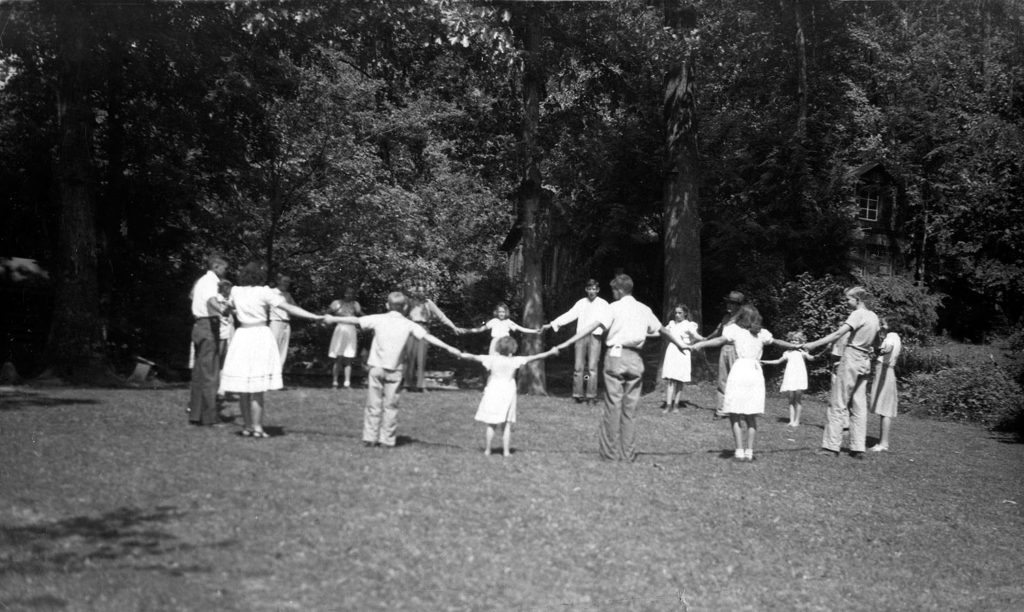Pine Mountain Settlement School
Series 18: PUBLICATIONS RELATED
“How Long Fork Began to Play on Sunday”
1924 Anon.

Line Fork community, dancing during the Baker years, early 1940s. [line_fork_005c-1.jpg]
TAGS: Publications related, Line Fork Settlement, playground, extension workers, Baptists’ skepticism of playground and dancing, community gatherings, The Survey
PUBLICATIONS RELATED 1924 Anon. How Long Fork Began to Play on Sunday
Transcribed below is an article that was written for the December 15, 1924, issue of The Survey by an anonymous Line Fork Settlement worker, who disguised the place as “Long Fork.”
TRANSCRIPTION
How Long Fork Began to Play on Sunday
It is a far cry from the conventional churches and playgrounds of the cities to Long Fork, up in the Kentucky hills, where one travels up one creek, over the divide, and down the other into lonely laurel-thicketed valleys. But the way the hard-shell Baptists came to Sunday play there is not without significance. From the settlement school worker who began the playground on Long Fork, comes the story at our request:
“Four years ago when the first extension work was begun on Long Fork there existed among the older people more misgivings about playground any day in the week. The folk dances, ring games and athletic games taught by the extension worker when she made her weekly visits to the community soon became popular with the young people. The older generation, on the other hand, placed them in the same category with their deep-rooted idea of dances—’the running of sets’—which they had come to associate with whiskey, shootings and killings. When it began to be noised about that the extension worker ‘was a-holdin’ dances’ on the creek, a number of parents, although they had not been on the playground to see for themselves, refused to allow their children to partake in what they considered a device of the devil. A considerable number of parents, [however], who had watched their children in their wholesome new play, continued to let them attend and in a little while it was demonstrated that the young ones were simply having ‘a peaceable and civil time’ on the playground. The playground idea was more or less rooted as far as it did not interfere with the home activities of the children and young people by the time the settlement house was completed.
“Before the advent of the settlement house, the Sunday School idea was almost as foreign to this community of Baptists (‘hard-shell’ for the most parts) as the weekday playground had been before the coming of the extension worker into the neighborhood. Some of the people actually had scruples against Sunday schools as such because of their creed. In spite of this, the plan, as outlined by the worker simply as a Sunday meeting, appealed to the majority and a Sunday school was organized and held in the schoolhouse each Sunday.
“The people as a whole, however, being naturally skeptical of gatherings of any sort because of their past experiences with them, feared that trouble would come out of the Sunday meetings. The workers, on the other hand, hoped to make of them a much needed opportunity for wholesome social intercourse. Necessarily they had to be very cautious in the beginning. At first the meetings consisted merely of singing, Bible stories and an occasional speech by some ‘outside’ visitor. As it became apparent that they were being held without any serious consequences the people began to linger afterwards to chat socially. Out of this hour following the usual meeting grew the Sunday playground. It came entirely from the people themselves.
“Aside from a few lingering fears that something would be bound to happen if such gatherings continued there was little criticism of the Sunday use of the playground. Sunday was the only day of the week when their work was entirely suspended. Formerly they had spent it according to their individual inclinations, and their ways probably would not have been considered orthodox in some more enlightened neighborhoods. Their new Sunday habits merely meant that their inclinations were directed in other channels. The question of whether it was right or wrong to play games on Sunday was not the issue. With them it was entirely one of whether it was safe to mingle in groups and whether it was a profitable and satisfying way to use their one free day in the week.”
Anon. For The Survey, December 15, 1924, Page 333.
See Also:
LINE FORK Settlement
Return To:
PUBLICATIONS RELATED Guide

